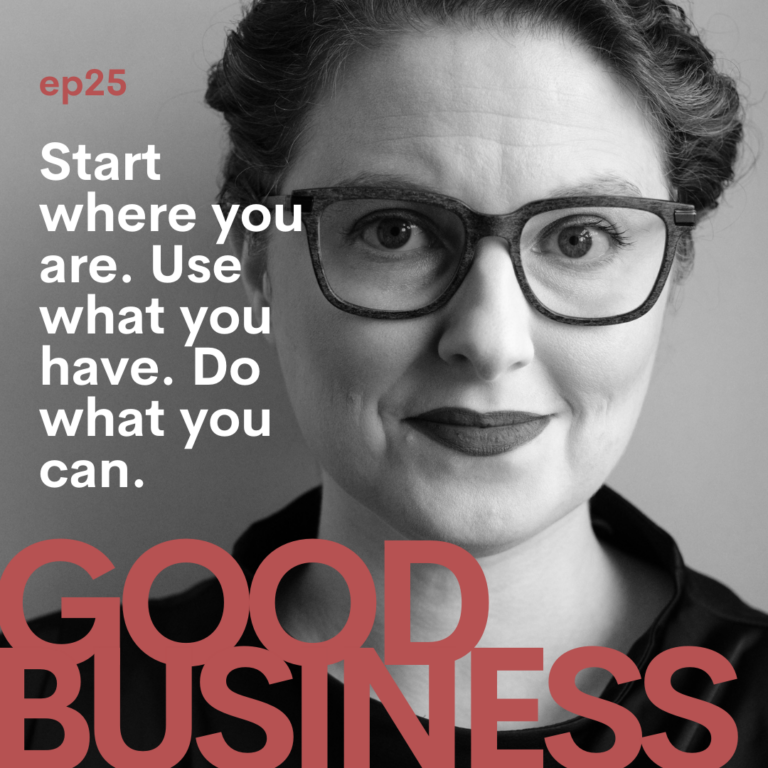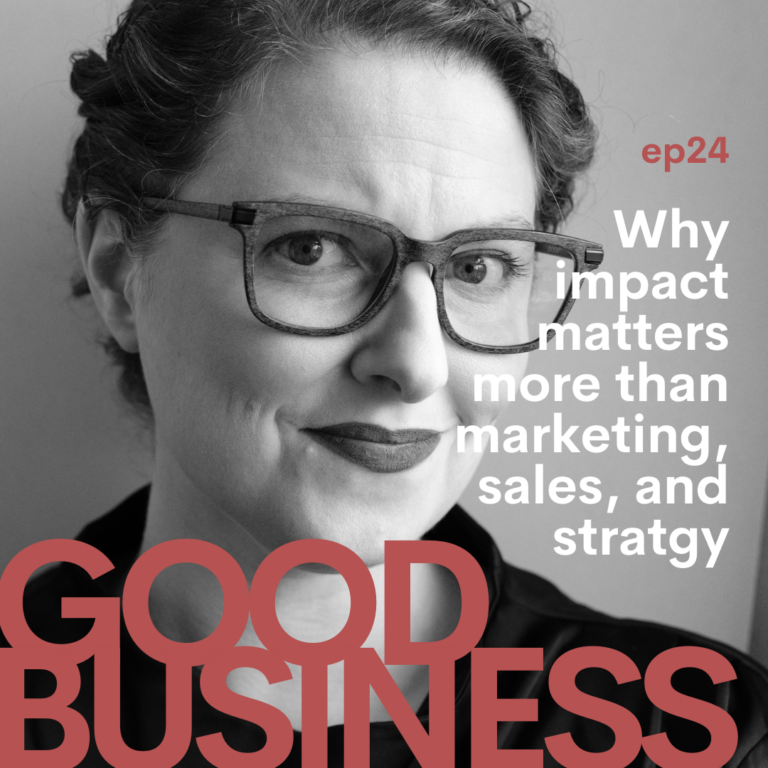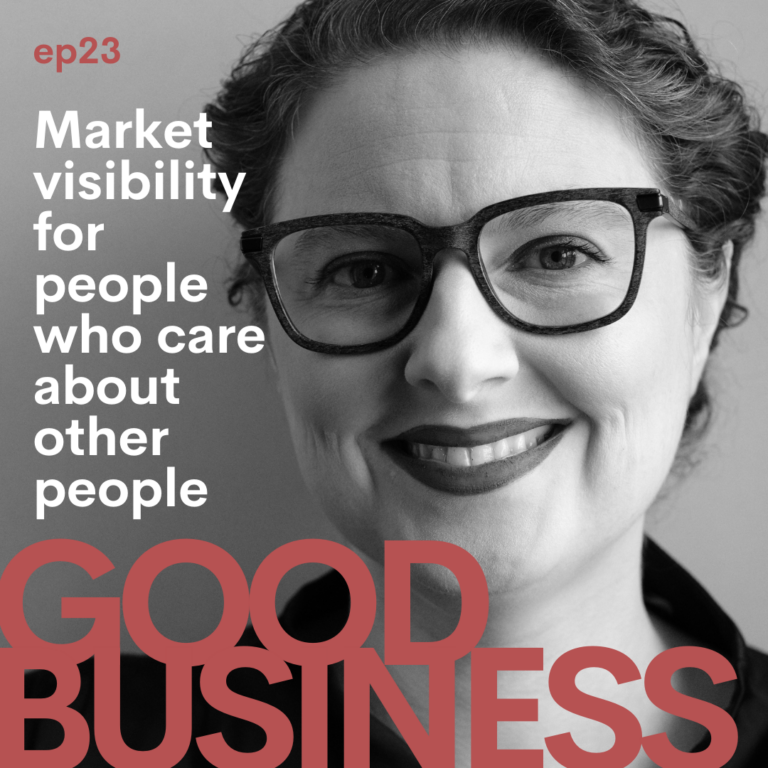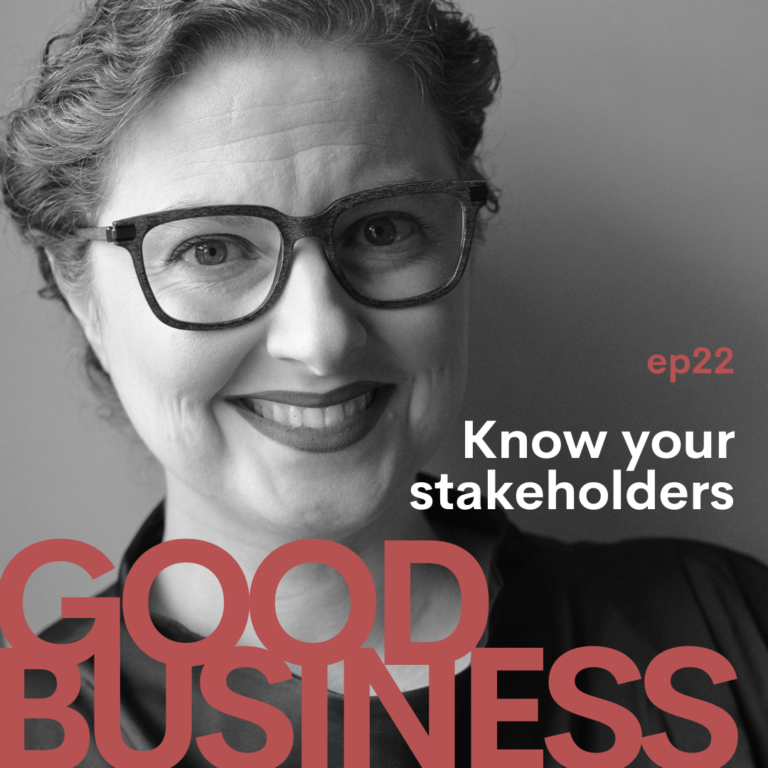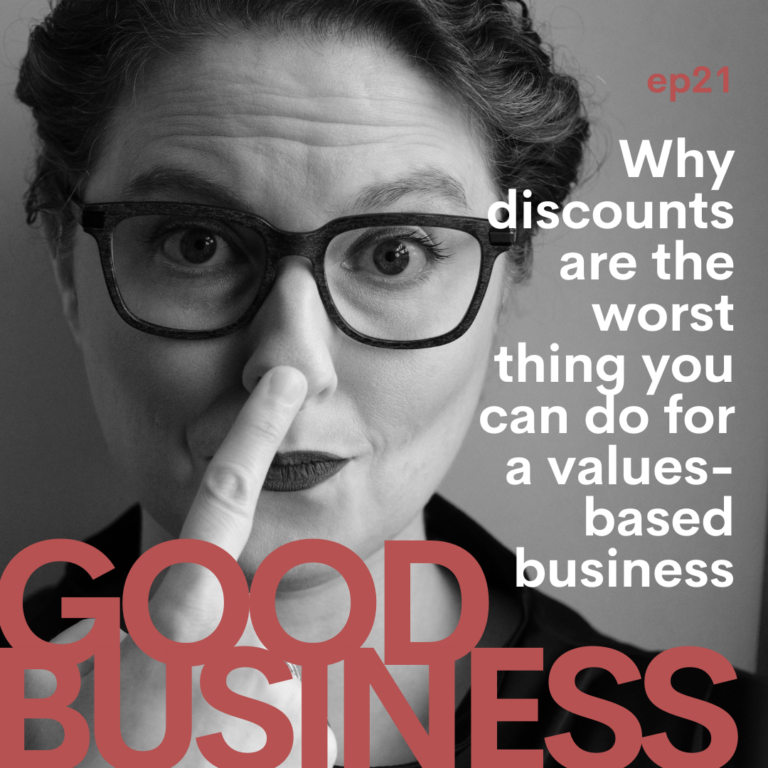In this episode, we’re talking about language and leadership.
Episode Transcript:
Hi everybody, and welcome back to the Good Business Podcast. I’m your host, Illana Burk, and today we are talking about language and leadership. This is one of my favorite topics because we are going to talk about the words that need to fucking go.
Now, first off, the reason why we’re talking about words today is because, marketing is hard. Marketing is complicated. We all like to make it more complicated, but it’s complicated all by itself because it requires a lot of guessing and a lot of understanding of psychology and a lot of, well forgiveness, I guess. You have to kind of keep banging your head against a wall and finding the cocktail of, of tone and connection and offer and voice. And doing that without willfully manipulating other people into buying things they don’t need or convincing them they have problems they don’t have makes it ever the more complicated.
That gets, that, that complexity breeds laziness. It breeds bandwagons. It breeds groupthink. And with it comes the cavalcade of words that everyone starts overusing that then become meaningless. For example, when I started blogging back in the dark ages, when dinosaurs roamed the earth, all the way back in, I don’t know, 2010 or something, there was only a couple people out there, in the online business space that cussed a lot, and it was not a bandwagon. It was still like, oh, my pearls, you know, the baby boomers out there were still wringing their hands and saying, “if only you’d be more professional and you’d get more clients.”
Now, it is all the rage. People say, fuck on the cover of their books now. They say, fuck on network television. I mean, fuck’s moment has arrived. We are all about giving the fucks now. Right? But it wasn’t always that way. Language changes over time. And the reason why it’s all the rage is because, everyone says it. And we are tired of pretending that we don’t. With that came a dilution. Fuck is still a pretty great word, I’m still gonna use it liberally. But, many other words kind of get the same treatment, but they don’t have the same impact and probably fuck will have less and less impact. It already does. I mean, frankly, it’s like we can say it around children and people just go, oh, could you not say that around my kid, maybe? You know, it’s like, people know this, this is the way it is now. The times have changed. The way we regard language has changed.
But what never stops being true, is when a word gets overused, especially in marketing, when everyone starts saying it, it loses its impact rapidly. And since the online business space specifically, and small business especially, are inundated with copywriters, marketers, creative thinkers who are all trying to get similar points across, especially among coaches and designers and the low-hanging fruit of online business. You know, the people who can easily work from a laptop and don’t have to be highly accountable to a team of people. That’s kind of mostly who I’m talking to here. Though this permeates larger businesses as well, this is really kind of my wheelhouse. Some of the words we’re talking about; things like bad-ass, clarity, confidence, transformation, trauma, mindfulness, authenticity, influencer. The list goes on and on; manifest, high vibe. Oh my God, there’s so many, right?
Now the unfortunate thing is a lot of these words were deeply meaningful to businesses that actually embodied them. But they got co-opted by all the shitty marketers out there. People like me and probably some of you, have ruined them and we’ve mushed them around and made them mean things that they don’t mean. I saw somebody recently say they were doing, they were sending out a series of marketing meditations, as an opt-in. There is the most telling set of words all mashed together of what I’m trying to express here, as I can possibly imagine.
Marketing meditations. I’m pretty sure that is not what the Buddhist monks had in mind when they started meditating. Right? The fuck is a marketing meditation? I have seen, people regard themselves as, let’s see. I saw somebody, I saw a copy once that said they were a bad-ass dental assistant on their LinkedIn page. That is not a bad-ass thing to be, a dental assistant in this world, unless you’ve got spikes on your knuckles and are doing dentistry at a biker bar, there’s nothing fucking bad-ass about being a dental assistant. Likewise, with “rebel,” “revolution,” all these words that used to mean something important, but don’t anymore because marketers have fucked it all up for everybody, myself included, fully guilty over here.
I have called things revolution in the past that are very, definitely not. I used to have a product called a brand revolution. Sounded really slick, I thought it was very clever. I even put parentheses around the re in revolution. So it’s like re evolution brand revolution. I thought I was an innovator there. I’m absolutely certain I was not, now. But this was, you know, a decade ago, and I didn’t have a lot of perspective yet. I do now. I promise you if it’s going on your website and you sell stuff, and the goal is to get somebody to buy now through a pay button or book a discovery call with you, you are not bad ass.
You are not a revolutionary. You are not starting a rebellion. You are just somebody selling something. No matter how much it’s going to change them, no matter how much it’s going to help them grow, those things are not fucking true. Revolutions change lives. They also are violent and terrible. We should not aspire to them, and we should not co-opt words that are meaningful to other people. It is hubris. It is privilege. We have to fucking knock it off. We have to stop using words that belittle and demean like “girl boss.” For fuck sake. Can we just be “boss”? You want to not be diminished. Don’t call yourself a girl boss. You want to be regarded for your intelligence? Just be a boss.
It’s one word that’s not terribly gendered. I’m sure it has etymology that goes back to terrible things, like most language. We have history, it’s terrible, that’s the way it is. Now, some of those things we have to delete from our lexicon. There’s all kinds of colloquialisms that we should get rid of and be more mindful of, because times have changed and we are evolving humans and it has nothing to do with being PC. It has to be, has to do with being a thoughtful, intelligent, human being who cares about other people. Which by the way, if you’re trying to sell something, you need to care about other people. If you don’t, you’re just the same as everybody else.
You know, I saw recently somebody posted about the etymology of the term cakewalk. It was goddamn, awful. I had no idea. I’m gonna really try hard not to use that phrase again. Go Google it, it’s terrible. There’s a whole bunch more. We all say things that are based in dark times in our history. But when you know better, you got to do better. And marketers are not very good at this. Marketers are much better at rationalizing. We’re really, really great at rationalizing the choices that we make and making our choices, okay, because we can say, well, “it is a revolution in marketing,” it is, “she is a revolutionary life coach.” Nuh uh, somebody who creates deep and lasting change, but only if you can prove it.
Ethical marketing is about having the incredible courage to just say only what you do and not making lofty promises that you cannot keep, and that cannot possibly be acquired from a $97 workshop. You will not have lasting change from a $97 workshop. You will not change who you are as a person from a $97 workshop. You will not have a whole new life as a $97 workshop. You got to know what you’re promising and whether you’re over promising and deliver only on your promises and be willing to use quieter language that might not grab as much attention and let your work stand for itself.
So go to your websites, look at your copy. What words are you using that aren’t true? What words are you using that are overused and are probably doing you a disservice? Think about it. If you see it on everybody’s website, if it’s on yours, people are ignoring it. They’re skipping right past it. And if they’re skipping right past it, then it’s taking up space. That is valuable real estate you could be telling somebody something interesting.
Use it well. Language is magnificent, poetic, beautiful, impactful, critical, even, but only if you use it well. So are you being lazy with your language? Or are you actually aspiring to elevate a conversation? My dear friend, Rachel Allen told me once that her biggest work in the world is to elevate a global conversation and it stuck with me for so long. And she does that through copywriting and she works hard to do that for her clients. That’s a noble pursuit. Can you actually say that when you sit down to put work out into the world that you think about whether or not you are elevating a conversation, or are you just part of the noise, trying to sell something.
It’s okay if you’re part of the noise, but don’t say you’re a revolutionary.
Alright everybody, hope you have a great day. Thank you all for tuning in. Bye.
More Episodes
Start where you are. Use what you have. Do what you can. | GB 25
Today’s episode of The Good Business Podcast is all about my very favorite quote in the whole world. “Start where you are. Use what you have. Do what you can.” by Arthur Ashe
Why impact matters as much as marketing, sales, or strategy. Maybe more. | GB24
Today’s episode is less of a lesson than recent episodes. Instead, today we’re making a case for a topic we’ll be talking a LOT more about in the future: IMPACT. What it is. Why it matters. And how to pay attention to it.
Market visibility for people who care about other people | GB23
Today is a branch off of our stakeholder conversation. If you listened to that episode, you should have a clear picture of exactly who matters to you and your work and why, as well as how much time you have for your work without sacrificing what those VIPs need and expect from you. Next up, we talk about exposure, protection, and the responsibility you have to those who matter most.
Know Your Stakeholders | GB22
In this episode, I’m going to walk you through how to think about establishing your stakeholders, the steps you need to take to do so, and how to make decisions based on who they are without compromising those big fat dreams we’ve been talking about.
Pricing Basics: Why discounts are almost never a good idea | GB21
Today’s episode dovetails on our last one, where we talked all about how your value isn’t determined by your price tag. Today, we’re talking about discounts. First, we’ll talk about why businesses offer them, what their purpose is and when they ARE a good idea. Then we’ll talk about why they are probably a bad idea for you and what to do instead.
Pricing Basics: Your value is not attached to your price | GB20
This episode breaks down the popular trope that if you don’t charge a lot, people won’t value your work. First, we talk about the conditions that make this a common piece of advice. Then I lay out why this is complete crap for certain kinds of businesses. Finally, the episode wraps up with a brief primer on how to think about pricing in a way that serves your people AND your bigger dreams for yourself.

